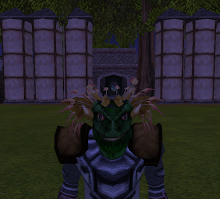http://www.mmorpg.com/gamelist.cfm?bhcp=1&page=1&game=17&feature=3694
Rather grandly, the piece starts out with the claim that "that one thing" that pulls millions to MMOs "is the feeling of connectedness with other people - the feeling of community". In my experience, to a very large extent, that simply isn't the case, although I wish it was.
The piece goes on to assert there's something special about logging into a virtual world that you don't get from solo games. For me, that's true - a solo game has to be very, very good now to draw me away from playing something else online. But sadly I would say the majority of online games – especially around launch – are far more about weeding out the chaff than enjoying the wheat, because being a part of something doesn't mean squat to most online gamers.
I'm not sure if someone out there has a magic figure for the amount of people that get past the first month of an MMO, and how quickly the player count drops off from there. It has to be massive. Personally, I've vowed not to play any MMO during launch month again and I suggest you make yourself the same solemn oath. Frankly, it's a bloody nightmare.
I would suggest the vast majority of MMO players – a good 90% – don't stay long enough to be part of the community in any sense beyond making up the numbers. After a few months of a game's launch, 'friend' lists make pretty depressing reading. But once the compulsive levellers, naysayers, free trialists and pre-teens bugger off to pastures new, the serious business of community building begins - if the game stays afloat, of course. Even then, many players just plug away solo, or with a friend or two, making no effort to connect with anyone else.
In an ideal world, community would be the thing that brought players to MMOs, but instead its relegated to one of the reasons why some people stay in them. In reality, I'd suggest people flock to MMOs because they love RPGs, and playing them in a group adds an interesting element. Solo RPGs tend to have a good 80+ hours of life in them, and cost the same as an MMO – often more. There's no reason not to pick up an MMO and play it for a month just as you might an RPG – if you put the hours in, you're certainly getting your money's worth without continuing to subscribe.
That quibble aside, it's a lovely article that does capture the community of Istaria. The likes of World of Warcraft and Lord of the Rings Online are outstandingly well put together games, but underneath all that polish an essential ingredient is missing – purpose. Sure, you can level up, then fight for your faction over the same piece of land every day or endlessly repeat the same dungeons to kit yourself (or your guild mates) out with all the latest uber togs. Until the next expansion comes along, and you do it all again...
In Istaria, the community works together to complete structures that are genuinely needed for everyone's life to be easier. Workshops are built (or rebuilt as people move on) near important resources; storage silos and banks go up to make crafting a smoother process; warriors clear areas of creatures so their guild mates can harvest particularly dangerous areas for the rarest ingredients; or fighters hunt for trophies that can be used to make more powerful items. There hasn't been a paid for expansion to Istaria, ever. But we're still playing it, still building and rebuilding and improving on what's there, like a real community should. Long may that continue.
Check out Istaria at www.istaria.com

No comments:
Post a Comment